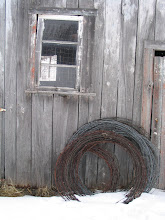I've been battling a row of badly-planted grapevines that, albeit productive, are growing in a bad location and are being slowly choked out by Jerusalem artichokes, wild asters and a plethora of other unidentifiable weeds. Today, aided by the thoroughly saturated ground, I was able to pull out the metal posts that made up the support fence with extreme ease. They were hammered about 2 feet into the ground, and I had initially put this on Eric's "Honey-Do" list. When I wiggled them today and found how easily the posts moved to-and-fro, I decided to tackle this job myself. Armed with a pair of fence building (or in this case, dismantling) pliers, I cut the metal wiring, recycled it, and proceeded to pull out all the metal posts. Job done. Next time Eric is busy with the bush-hog, he can mow this area easily, and we'll have one less eyesore on the horizon. Progress, indeed!
With our heavy rains, our clay soil is thoroughly saturated. I was actually getting worried as I was weeding my dandelions and burdock. I've never experienced this before, but as I was walking on the grass, I could actually feel the ground moving beneath my feet, and hear what could best be described as water squishing in and out as I weeded, and not just under my feet, but in my general proximity. This got me thinking about leda clay and the mechanics behind soil liquifaction. If we didn't live on flat land, I'd be worried about quick-clay slides that our region between Ottawa and Quebec City is prone to. The upside of this ground saturation was the ease at which the metal posts came out, but still, it can stop raining any day now. We're good for a while.
On a completely unrelated note, I've been fighting elecampane (Inula helenium) for years now. This plant can easily reach 6 or 7 feet in height, and has a couple of not-so-charming properties. When run over with a mower, it can stop the mower dead in its tracks with its masses of fibrous leaves. Even the bush-hog has a hard time with it, and I can always tell when Eric runs over a patch, because it really bashes the blades of the bush-hog around. At the first sign of frost, the plant wilts into a dark, slimy mess. In doing a bit of research, this is what Pliny said about it:
"Let no day pass without eating some of the roots of elecampane,
to help digestion, to expel melancholy, and to cause mirth."
Well, hell! That's what I'm missing in my life - mirth! And here it is, right under my nose all this time. I'm going to have to give this elecampane plant a second chance after all. I'll be sure to let you know just how mirthful I become. (And in doing some more sleuthing, I found that researchers at the Cork (Ireland) Institute of Technology have proven that an extract of elecampane is 100% successful against the MRSA superbug. Fascinating, isn't it?)
What's not so fascinating is that I have this stuff all over my lawn! If I had a way to control it, I'd happily plant a few plants in the garden. I guess that all depends on the level of mirth I attain.
What's not so fascinating is that I have this stuff all over my lawn! If I had a way to control it, I'd happily plant a few plants in the garden. I guess that all depends on the level of mirth I attain.



2 comments:
Wow a plant that can make you mirthful. hehe. I've never seen it before but that picture of it blooming on wikipedia is pretty. It might not make me so mirthful if I was having to battle with it with a lawnmower though.
Well Robin, let me tell you how mirthful I became yesterday as I was mowing it down! I have to say, the smell of the plant is spectacular. It's a clean, green floral scent. I stopped myself short of gnawing on the root, but trying it is still on my agenda LOL. Apparently this stuff is used to make absinthe, so who knows how mirthful it can make you?! I'm keeping one that's already about hip-high, but death to the rest!
Post a Comment